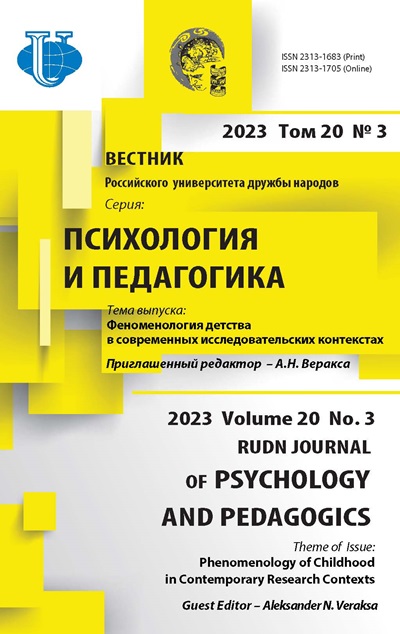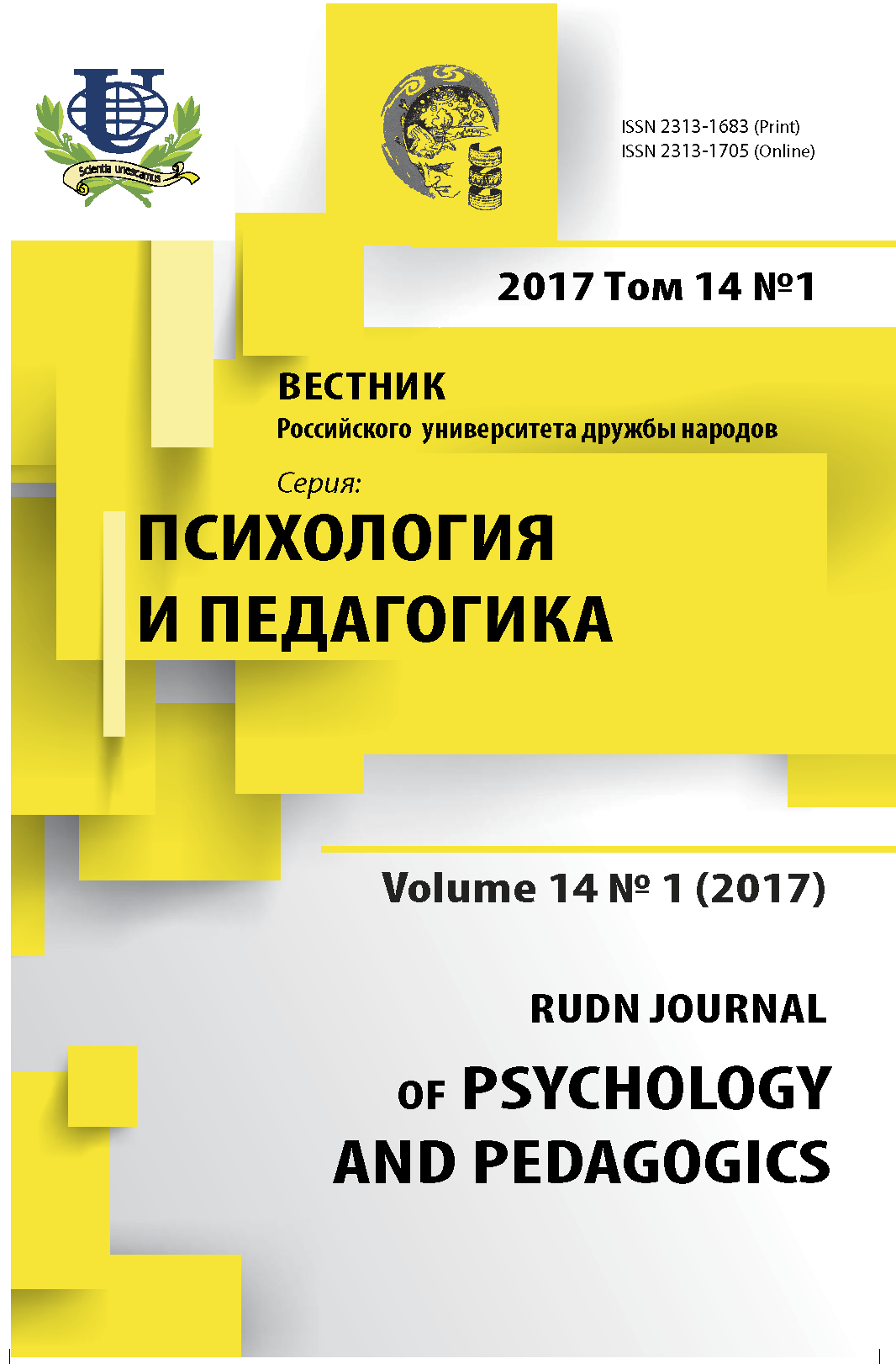CHARACTERISTICS OF CREATIVITY AND INNOVATIVENESS MANIFESTATIONS IN STUDENTS OF MIDDLE AHD HIGH SCHOOL
- Authors: Mikhailova O.B1
-
Affiliations:
- Peoples’ Friendship University of Russia
- Issue: Vol 14, No 1 (2017)
- Pages: 76-87
- Section: Articles
- URL: https://journals.rudn.ru/psychology-pedagogics/article/view/15368
- DOI: https://doi.org/10.22363/2313-1683-2017-14-1-76-87
Cite item
Full Text
Abstract
The development of a young person’s potential capabilities is one of the important directions in the modern practicing psychologists’ activity. The absence of a scientifically motivated way of analyzing the innovation potential development in a personality and the formation of principles and methods regulating its progress allowed to formulate the aim of the research, which is to work out a technology of innovation potential development and self-realisation in a personality on the basis of empirical investigations. The technology is to forward the introduction of a system of theoretical and practical basics for the innovation potential evolution in different periods of personal development.The distinctive peculiarity of the given article is the integration of psychological and pedagogical approaches to analyzing the preconditions of basic creativity and innovativeness development in a personality in secondary school educational environment. As a result of the study we analyzed the qualitative and quantitative information about the features of the innovative behavior and creativity in the students of 13-14 years old and students of 16-18 years old.The interpretation of the numerous data suggests that there are significant differences in the features of creativity and innovativeness in the students of different ages. Based on the results, the article presents the recommendations for the improvement of psychological and pedagogical technologies that accompany the formation of the innovative potential of a personality in middle and high school.
About the authors
Olga B Mikhailova
Peoples’ Friendship University of Russia
Author for correspondence.
Email: mikhaylova_ob@rudn.university
Кафедра социальной и дифференциальной психологии
Miklukho-Maklaya str., 6, Moscow, Russia, 117198References
- Bozhanova, N.A. (2005). Lichnostnaja gotovnost' k peremenam v kontekste issledovanija fenomena “ozhidanija: Perevod i aprobacija oprosnika “Personal change-readiness survey”. Acta eruditorum. Nauchnye doklady i soobshhenija (Prilozhenie k zhurnalu “Vestnik RHGA”, (2), 169-178). St. Petersburg: RHGA Publ. (In Russ.).
- Bogoyavlenskaya, D.B. (2002). Psihologija tvorcheskih sposobnostej. Moscow, Akademija. (In Russ.).
- Chernecov , P.I. & Vinogradova, T.I. (2015). Relationship intelligence and creativity of adolescents. Siberian Pedagogical Journal, (1), 80-83. (In Russ.).
- Csikszentmihalyi, M. (1999). Implications of a Systems Perspective for the Study of Creativity. In by Sternberg, R. J. (Ed.). Handbook of Creativity (pp. 313-335). Cambridge: Cambridge University Press.
- Elkonin, D. B. (2001). Psihologija razvitija cheloveka. Moscow: Aspekt Press. (In Russ.).
- Erikson, E. (2006). Identity: youth and crisis. Moscow: Flinta. (In Russ.).
- Gupta, A K., & Wilemon, D. (1996). Changing Patterns in Industrial R&D Management. Journal of Product Innovation Management, (13), 497–511.
- Ilin, E.P. (2009). Psikhologija tvorchestva, kreativnosti, odarennosti. St. Petersburg: Piter Kom. (In Russ.).
- Kaptsov, A.V., & Kolesnikova, E.I. (2011). The metodical aspects of use of psychometric tests in degree designing. Vestnik of Samara humanitarian Academy. A Series Of "Psychology", 2 (10), 107-119. (In Russ.).
- Lebedeva N.M., Bushina E.V., & Cherkasova L.L. (2013). Values, social capital and attitude to innovations. Social sciences and modernity, 4, 28-41. (In Russ.).
- Malceva, L.D. (2013). Ontology and theory of education: from creativity to innovation. Scientific search, (3), 56-59. (In Russ.).
- Mihailova, O.B. (2013). Adaptedness to professional activity as a determinant of innovation potential realization in a personality. Bulletin of the Novosibirsk State University. Series: Psychology, 7 (1), 52-57. (In Russ.).
- Mihailova, O.B. (2013). Civic patriotism as a basis for axiological and motivational activity of a personality involved in innovation activity. Bulletin of Peoples' Friendship University of Russia. Series: Psychology and Pedagogics, (3), 14-21. (In Russ.).
- Mihailova, O.B. (2012). Psychological characteristics of innovativeness of contemporary managers’ personality. Bulletin of the Novosibirsk State University. Series: Psychology, 6 (2), 38- 43. (In Russ.).
- Nikolaeva, E.I., & Beljaeva, E.M. (2015). A comparative analysis of the creativity in adolescents with different levels of aggressiveness. Scientific opinion, 6, 161-166.
- Robinson, L. Jr., Marshall, G.W., & Stamps, M.B. (2005). Sales force use of technology: Antecedents to technology acceptance. Journal of Business Research, (58), 1623–1631.
- Romanenko, I.B. (2010). Innovacionnost' i kreativnost' kak fenomeny kul'tury i obrazovanija: chelovecheskij kapital. Moscow: AST-Press. (In Russ.).
- Simonton, D.K. (2001). Creativity in personality, developmental, and social psychology: Any links with cognitive psychology? In Ward, T, Smith, S, Vaid J. (Eds.) Creative Thought: An Investigation of Conceptual Structures and Processes (116–133). American Psychological Association.
- Sovetova, O.S. (2000). Osnovy social'noj psikhologii innovacij. St. Petersburg. (In Russ.).
- Torrance, E. P. (1988). The Nature of Creativity as Maintest in Its Testing. In: R. J. Sternberg (Ed.). The Nature of Creativity. Cambridge: Cambridge University Press.
- Ushakov, D.V. (2004). Social'nyj intellekt: teorija, izmerenie, issledovanija. Moscow: Institut psikhologii RAN Publ. (In Russ.).
















